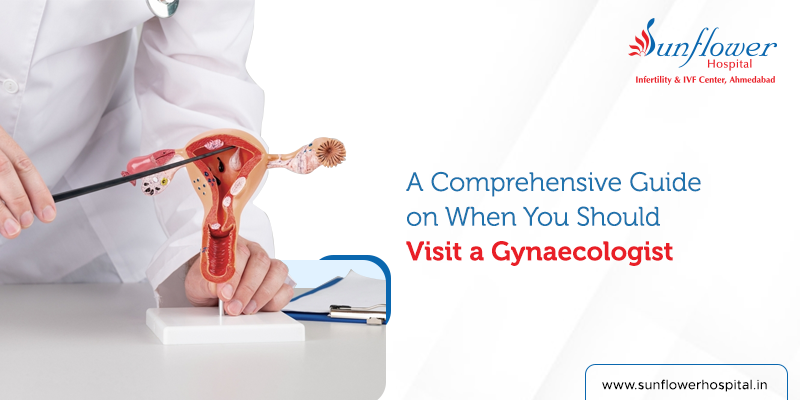In India, even today, the majority of girls/women shy away from going to gynaecologists or even talking about certain things concerning their reproductive health. The nation is developing, and we need to educate and encourage girls/women to visit gynaecologists for periodic check-ups. Having the best gynaecologist in Ahmedabad, it is our responsibility to do that and thus this blog.
Common Reasons to See a Gynaecologist
There are several common and patient-specific reasons to see a gynaecologist, but you need consultation and care for the following.
- Discuss birth control options.
- A screening test - pap smear to check for cervical cancer
- If you have painful, irregular, or heavy menstrual cycles
- Tests for STIs (Sexually Transmitted Infections) like gonorrhea, chlamydia, and trichomoniasis
- Discuss changes in discharge that can be a symptom of vaginal infection.
- Discomfort or pain during intercourse
- Signs of UTI (Urinary Tract Infection) include bloody or cloudy urine, a burning sensation when urinating, a strong urge to urinate, or urinating more often than usual.
- Bumps, irritation, or rashes around the vulva (outside area of the vagina)
- Menopause or perimenopause symptoms like hot flashes, irregular menstrual, or vaginal dryness.
What Happens During Your Visit to a Gynaecologist?
Just like any medical professional, our gynaecologist will question your medical history. They will then proceed by asking questions about sexual intercourse if required, and the questions can revolve around the time you started, your current sexual life, and your wish/plan to grow a family.
Moreover, the gynaecologist will conduct necessary examinations, including belly, pelvic, and breast exams. Overall, your initial visit will involve discussions and tests to analyze your condition best. The following visits and recommendations will depend on the results of the examinations.
What to Discuss with Your Gynaecologist?
There’s a lot that happens in women’s bodies and determining what is normal, especially when it comes to reproductive and sexual health. Therefore, please feel free and not embarrassed to discuss issues with our gynaecologists. Some things that you should talk about are:
- Heavy or painful menstrual cycles, since it can indicate uterine fibroids or endometriosis.
- Changes in your vaginal odour, a fishy or foul smell since it can be a sign of vaginal infection or bacterial overgrowth.
- Abnormal growth or swelling bumps in the vagina or near the labia since it can lead to severe conditions.
- Sexual discomfort like pain during intercourse or vaginal dryness.
- Sexual history to ensure that there is no concern for STDs, cervical dysplasia, or HPV infection.
- Urinary leakage of faecal leakage is to receive timely treatment and prevent the condition from worsening.
- Low libido since it can be a symptom or a side effect of any medical condition.
How Do You Feel Comfortable During Gynaecologist Visits?
You are on your way to discussing topics that might make you uncomfortable or nervous but know that it is okay to talk about all those things. Here are some things you can do to stay comfortable throughout the visit.
- Let the gynaecologist know that you are nervous or anxious.
- Inform the caregiver if it is your first pelvic examination.
- Clear all your doubts and queries before the physical examination begins.
- Engage in relaxation techniques like mindful breathing during the examination.
- Be vocal about any sexual trauma or assault and inform the caregiver if you cannot participate in certain examinations or if they are challenging for you.
- Ask the gynaecologist to explain every exam and why it is necessary. Also, ask about stages that can feel uncomfortable during the exam.
A Note from Sunflower Infertility & IVF Center
Regular gynec visits are very important to ensure that your reproductive and sexual health is up to the mark. At Sunflower Infertility & IVF Center Our gynaecologists will check your condition thoroughly and recommend lifestyle changes or relevant medications/treatments.


Leave a Comment